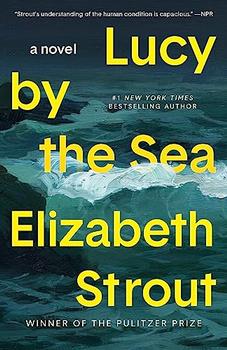Book Club Discussion Questions
Want to participate in our book club? Join BookBrowse and get free books to discuss!
Please be aware that this discussion guide will contain spoilers!
- At the start of the novel, Lucy doesn't understand William's concern about getting out of New York City. Could you understand Lucy's ambivalence? How did you process the early days of the pandemic?
- Reflective. Melancholy. Hopeful. Insightful. How would you describe the tone of Lucy by the Sea, and why?
- Discuss Lucy's relationship with her ex-husband, William. Why do you think they have remained in each other's lives for so long? Were you satisfied with how they ended up at the end of the novel, or were you wary, like their daughters? Please explain.
- There are many moving scenes in Lucy by the Sea. Which ones stayed with you, and why?
- Lucy's brother. William's half-sister. How did these siblings shape Lucy and William? What role did siblings play in their lives?
- What is the significance of Lucy's feelings toward Bob Burgess? Were you surprised by the direction it took? Why, or why not? How do you think this connection will endure beyond the novel?
- Why do you think Lucy invented a mother? What does this say about how we deal with trauma in the past?
- William became quite curious about the discovery of the distant guard tower along the shore. What do you think this represented for William? What sort of touchstone did it provide?
- Lucy takes many walks, alone and with others. Do you like to take walks? Why, or why not? What are the benefits of this activity, particularly for Lucy?
- Discuss Lucy's relationship with her daughter Becka. How was hers different than Becka's relationship with William? Why do you think Becka started to pull away from Lucy after leaving her poet-husband?
- What did you think about Lucy's friendship with Charlene Bibber, a fellow volunteer from the food pantry? Did it provide any lessons for Lucy? What do you make of Charlene's story about stealing a nursing home resident's shoe?
- After a surprise visit with her daughters, Lucy observes: It is a gift in this life that we do not know what awaits us. Do you agree with this sentiment? Why or why not?
- William had many affairs. Lucy had hers. Now their daughter, Chrissy, was thinking of having one. Why do you think people cheat on their spouses? Is it all about loss, as Lucy's therapist once suggested, or are there other circumstances to consider?
- Later in the novel, Lucy observes: My childhood had been a lockdown. What did she mean by this? How do you think growing up poor shaped Lucy's life? How did she persevere?
- When Lucy was pregnant with Chrissy, she remembers putting her hand over her stomach and thinking, Whoever you are, you do not belong to me. My job is to help you get into the world, but you do not belong to me. Do you understand what Lucy means? What does this statement mean to you?
- If you were to have Lucy and William over for supper, what would you serve, and why?
- Throughout the novel, Lucy reflects on many parts of her life: her mother, her siblings, growing up, her marriages. Later Lucy starts to forget things. What role does memory play in Lucy by the Sea?
The Wisdom of Lucy Barton
"You're a spirit, Lucy. You know things. I've told you that before. There is no one else out there like you."
—WILLIAM
Here is what I did not know that morning in March... . I did not know that my entire life would become something new.
It's odd, how the mind does not take in anything until it can.
For a number of days—and it turned into weeks—I looked at the floor frequently as we watched the news at night.
It is interesting how people endure things.
Who knows why people are different? We are born with a certain nature, I think. And then the world takes its swings at us.
I did not know how I felt about William. My feelings changed about him, they went up and down with the tides.
It is a gift in this life that we do not know what awaits us.
We are only doing what we can to get through.
We all live with people—and places—and things—that we have given great weight to. But we are weightless, in the end.
Unless otherwise stated, this discussion guide is reprinted with the permission of Random House. Any page references refer to a USA edition of the book, usually the trade paperback version, and may vary in other editions.




